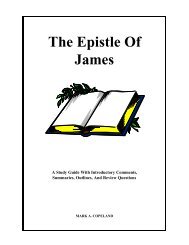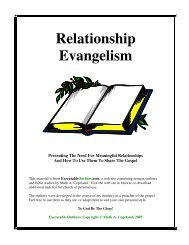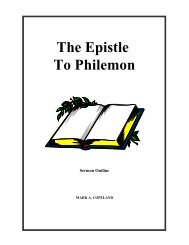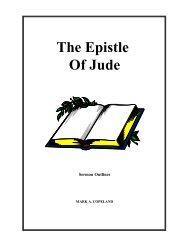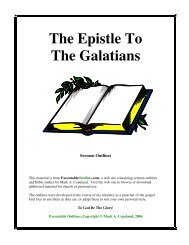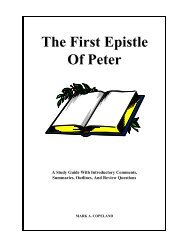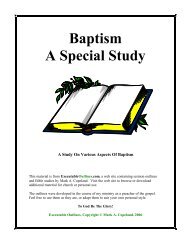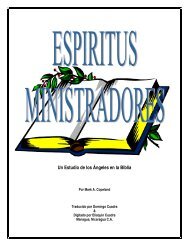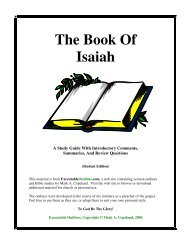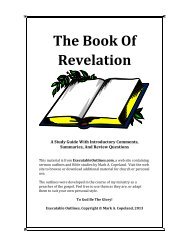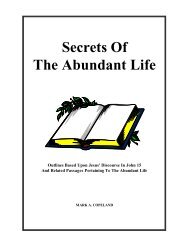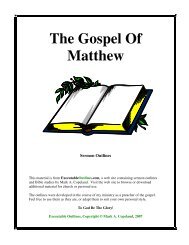The Epistle To The Hebrews - Executable Outlines
The Epistle To The Hebrews - Executable Outlines
The Epistle To The Hebrews - Executable Outlines
You also want an ePaper? Increase the reach of your titles
YUMPU automatically turns print PDFs into web optimized ePapers that Google loves.
Mark A. Copeland<br />
f. “<strong>The</strong> contented man is never poor, the discontented never rich.” (George Eliot)<br />
2. Paul wrote that “...godliness with contentment is great gain.” - 1 Ti 6:6<br />
a. Godliness, which is godly living expressed in devotion to God, is of great value only<br />
when accompanied with contentment<br />
b. For as we have seen, covetousness (a lack of contentment) would render any service to<br />
God of no value<br />
C. CONTENTMENT EXEMPLIFIED...<br />
1. In Fanny Crosby (1820-1925), a blind songwriter who wrote:<br />
O What a happy soul am I!<br />
Although I cannot see,<br />
I am resolved that in this world<br />
Contented I will be;<br />
How many blessings I enjoy<br />
That other people don’t!<br />
<strong>To</strong> weep and sigh because I’m blind,<br />
I cannot, and I won’t.<br />
2. In Helen Keller (1880-1968); blind, deaf, and mute, yet she wrote:<br />
<strong>The</strong>y took away what should have been my eyes,<br />
(But I remembered Milton’s Paradise)<br />
<strong>The</strong>y took away what should have been my ears,<br />
(Beethoven came and wiped away my tears)<br />
<strong>The</strong>y took away what should have been my tongue,<br />
(But I talked with God when I was young)<br />
He would not let them take away my soul,<br />
Possessing that, I still possess the whole.<br />
3. In the aged prisoner, Paul the apostle...<br />
a. Who saw how his imprisonment accomplished much good - Ph 1:12-14<br />
b. Who had learned contentment - Ph 4:10-12<br />
[<strong>The</strong> virtue of contentment richly blessed the lives of these and countless others. But as Paul indicated,<br />
contentment is something “learned”. How then does one develop contentment?]<br />
II. THE KEY TO CONTENTMENT<br />
A. TRUSTING IN GOD’S PROVIDENTIAL CARE...<br />
1. This is the reason given in our text for us to be content - He 13:5-6<br />
a. God has promised never to leave nor forsake us<br />
b. With the Lord as our helper, what can man do? - cf. 1 Jn 4:4<br />
2. This is the reason Jesus gave for us not to worry - Mt 6:25-32<br />
a. We are of greater value to God than the birds or flowers<br />
b. He providentially cares for them, will He not do the same for us?<br />
-- <strong>The</strong> key to receiving this care is to put God’s will first in our lives - Mt 6:33<br />
3. Contentment comes, then, when we trust God will provide what we need!<br />
B. KNOWING WHAT YOU CAN’T TAKE WITH YOU...<br />
1. As Paul discussed contentment, he pointed out certain truths - 1 Ti 6:7<br />
a. We brought nothing into this world<br />
b. It is certain we can carry nothing out! (have you ever seen a hearse pulling a U-Haul<br />
Sermons From <strong>Hebrews</strong> 118



